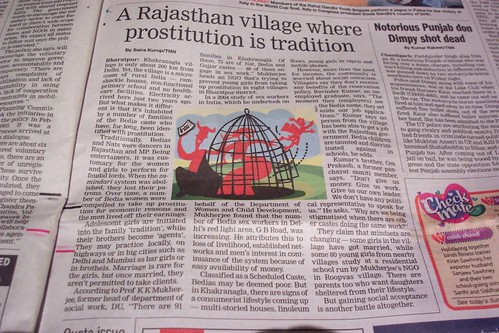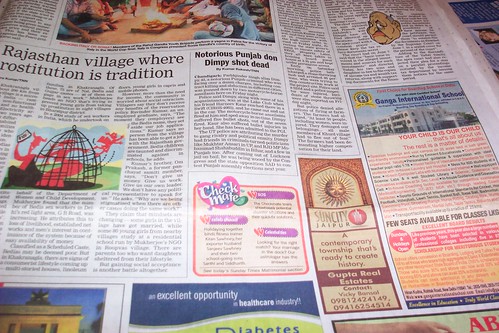Khakranagla village - prositution is the tradition for women here

I can't find the online article for this one yet.. will search later this week and re-post if they upload it.
A Rajasthan village where prostitution is tradition
by Saira Kurup / TNN
from Sunday Times of India, New Delhi
July 9 2006
page 7
[quote]
" Bharatpur: Khakranagla village is only about 200 km from Delhi. Yet, the village is a microcosm of rural India - ramshackle houses, non-functional primary school and no health care facilities. Electricity arrived here just two years ago. But what makes it different is that it's inhabited by a number of families of the Bedia caste who have, for long, been identified with prostitution.
Traditionally, Bedias and Nats were dancers in Rajasthan and MP. Being entertainers, it was customary for the women and girls to perform for feudal lords. When the zamindari system was abolished, they lost their patrons. Over time, a number of Bedia women were compelled to take up prostitution for economic reasons and the men lived off their earnings.
Adolescent girls are initiate into the family 'tradition', while their brothers become 'agents'. They may practice locally, on highways, or in big cities such as Delhi and Mumbai as bar girls or in brothels. Marriage is rare for the girls, but once married, they aren't permitted to take clients.
According to Prof K K Mukherjee, former head of department of social work, DU, "There are 91 families in Khakranagla. Of these, 75 are of Nat, bedia and Guijjar castes - 46 of them engage in sex work." Mukkherjee heads an NGO that's trying to prevent young girls from taking up prostitution in eight villages in Bharatpur district.
In a 2004 study of sex workers in India, which he undertook on behalf of the Department of Women and Child Development, Mukherjee found that the number of Bedia sex workers in Delhi's red light area, G B Road, was increasing. He attributes this to loss of livelihood, established networks and men's interest in continuance of the system because of easy availability of money.
Classified as a Scheduled Caste, Bedias may be deemed poor. But in Khakranagla, there are signs of a consumerist lifestyle coming up - multi-storied houses, linoleum floors, young girls in capris and mobile phones.
However, more than the need for income, the community is worried about social ostracism. Villagers say they don't receive ny benefits of the reservation policy. Ravinder Kumar, an unemployed graduate, says, "The moment they (employers) see the Bedia name, they set aside our job applications." Kumar says no person from the village has been able to get a job with the Rajasthan government. Bedia children are taunted and discriminated against in schools, he adds.
Kumar's brother Om Prakash, a former panchayat samiti member, says, "Don't give us money. Give us work. Give us our own leader. We don't have any political representative to speak fo us." He asks, "Why are we being stigmatised when there are other castes doing the same work?"
They claim that mindsets are changing - some girls in the village have got married, while some 80 young girls from nearby villages study at a residential school run by Mukherjee's NGO in Roopvas village. There are parents too who want daughters sheltered from their lifestyle.
But gaining social acceptance is another battle altogether. "
[/quote]
wow. my mind was racing whilst reading this article. it's just SO FOREIGN to me. for a start I don't understand all the different castes here in India and why, in this day and age, that they are still around. when you talk to people at work they say there's no caste system any more, but they each know what caste they are from.
just the fact that these women have had to support themselves and men from prostitution and pass this on to their daughters is crazy to me. plus the fact that villagers are discriminated against for being Bedia and cannot get work. there's just so many things worng with all the things mentioned in this article! and perhaps it is naive of me to say that, after seeing how some people live here in Delhi, but it shouldn't be this way!!! and I'm surprised and disheartened that locals here don't put an end to it. it can't all be the government's fault as seems to be the case (or at least they are blamed) for other conditions.
I'd like to find out more about the NGO that is working with the women and people of the village. googling the village name returns no results as does searching for the Professor's name and NGO.. I'll try contacting the paper for the journalists name, perhaps they know the name of the NGO.
and another thing.. how ironic is it that this article in the paper lies next to the 'Check Mate' dating and matramonial advertisements, and a couple of columns next to an ad for Ganga International School where "your child is our child" and "SUNCITY Jaipur" - "A contemporary township that's ready to create history". under the article is an ad for "Canton City" - "A luxurious township"
craziness


::: category:
::: location:
- kathy's blog
- Log in to post comments
- 9372 reads
